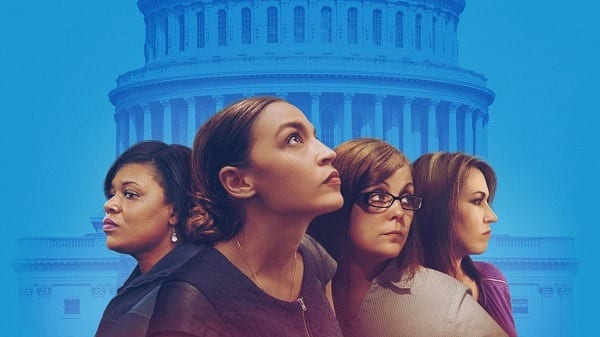Netflix’s latest political documentary, Knock Down the House, chronicles Ocasio-Cortez and three other women civilians-turned-politicians, Paula Jean Swearengin, Amy Vilela and Cori Bush, fighting for social justice and more diverse representation in US congress.
The documentary is a social commentary about a critical time in recent US political history – the 2018 midterm elections – and the historic number of first-time candidates running for office. Their grass-roots campaigns were similarly prompted by Trump’s 2016 election, the ‘established’ Democratic candidates’ impotence and to raise the profile of social justice issues.
These women are mad as hell, and rightfully so.
They feel they are being misrepresented by ‘career politicians’ who campaign hard about addressing community issues but whose specific skillsets lies in their apathetic inaction.
(In one pre-election community debate against Ocasio-Cortez, Democratic incumbent of fourteen years, Joe Crowley, sent a stand-in to speak on his behalf. He also did not live in the area in which he had been appointed to serve.)
These local incumbents, however, are still popular and powerful – and some of their supporters vehemently oppose the idea of their representative facing a primary election challenge by an unknown contender.
In the documentary, Ocasio-Cortez addresses this issue at a Netroots Nation Conference, a political convention for progressives: “People say, ‘how dare you mount a challenge to someone who’s so established’.”
“Well, if they’re good enough they’ll win. And if we’re good enough, we’ll win.”
All four women are especially motivated by their personal beefs with US politics and elected representatives.
In West Virginia, where Swearengin was proudly born and raised, coal mining has decimated the local environment and waterways, and she says it’s making people sick.
Swearengin gives the audience a tour of her neighbourhood: “As we go around the block, I’ll try to point out some of the houses that I know that people had cancer.”
She says the mine provides few, if any, job opportunities for locals, but the local incumbent senator is being funded by ‘big industry’.
“If another country came in here and blew up our mountains and poisoned our water we’d go to war, but industry can,” Swearengin pointedly observes.
Vilela takes aim at the US’ elitist public health system.
Her 22-year old daughter was refused lifesaving medical tests when she presented to the ER ‘exhibiting symptoms of a blood clot’ because she couldn’t provide proof of health insurance.
She was then left braindead after she suffered a pulmonary embolism.
Vilela says 30,000 American families a year lose loved ones who are refused medical care for not having costly medical insurance.
She holds up her smartphone and explains: “This is a commodity,” she says. “My daughter’s life was not.”
Bush is an ‘accidental activist’ from St Louis.
A nurse, ordained pastor and mother, who fell into activism after the Ferguson protests which erupted in response to the fatal police shooting of unarmed African American teenager Michael Brown, during which she provided medical care on the street.
“People are now waking up to see that the problems we have in our district are problems that we ourselves can fix.”
Ocasio-Cortez is passionate about every day, ordinary Americans getting a fair go. She believes Crowley, known as ‘The Queens Machine’, is more self-serving politician than a man of the people.
“We’re up against an opponent who’s taken three million dollars per cycle from Wall Street, real estate and pharmaceutical companies. We need to have the courage to stand up for working people and stand up against corporate interest.”
While Swearengin, Vilela and Bush were ultimately unsuccessful in getting elected, their campaign platforms prompted people to realise that the current political system is not set up to support the American Dream.
Their grass-roots campaigns put enough pressure on the Republican’s that they lost control of the House of Representatives.
Most importantly, the work of these four women (and other first-time candidates not featured in the documentary) in gaining momentum for social change resulted in an historic shift towards diversity of political representation.
Ilhan Omar and Rashida Tlaib became the first Muslim congresswomen, while Sharice Davids and Debra Haaland are the first Native American congresswomen to be elected.
As Ocasio-Cortez consoled Vilela over the phone after her loss, “it’s just the reality that in order for one of us to make it through, a hundred of us have to try.”
Ocasio-Cortez was one of the few to defy those odds, overcoming Crowley and winning the hearts and minds of thousands of Americans in the process.
“You know what? We met ‘The Machine’ with a movement – and that is what we have done.”


